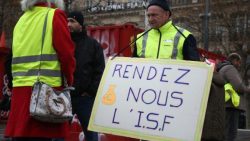
In 2017, President Emmanuel Macron repealed the French Solidarity Wealth tax (in French: Impôt de solidarité sur la fortune or ISF), in order to support investment, employment, innovation and economic growth in France. The ISF had to be paid by individuals whose estate exceeded the taxation threshold which was set at 1 300 000 EUR. This decision triggered a strong discontent among the lower-middle class, which has been captured by the yellow vests movement. The public pushback against the suppression of this specific tax may be very surprising as the economic consequences of the ISF were very disappointing. The deep nature of the dissatisfaction was eminently symbolic, as this wealth tax has been raised as a political symbol of the left-right ideological divide on taxation. President Emmanuel Macron chose to honor the individual freedom to enrich oneself and refused to reintroduce the ISF. By doing so, he confirmed the image of being a « President of the rich ». This determination in pursuing important fiscal reforms while ignoring popular opposition will certainly have political consequences, which will be assessable during next presidential elections that take place in April 2022.
Recent Comments